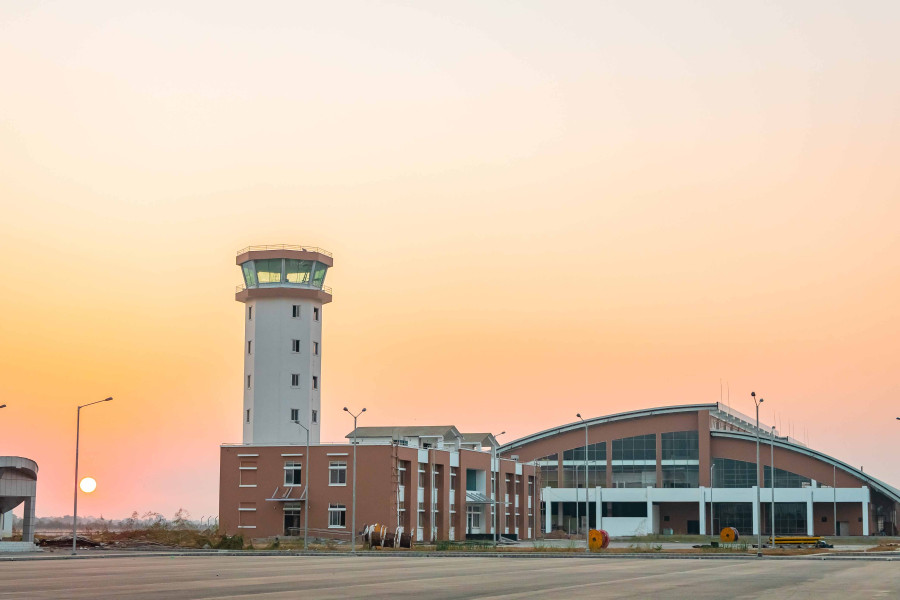Money
Power malfunction holding up testing of radio equipment
The power supply reliability at Bhairahawa airport should reach 99.99 percent, which is equivalent to less than 30 seconds of power outage 24/7.
Sangam Prasain
Technicians conducting trials on the newly-installed communication and navigation equipment at Bhairahawa's upcoming international airport said a glitch in the electricity supply was preventing them from completing their task.
"The power supply, which is also under test, has been shutting down after 4-5 hours," an airport official said. “The technicians are clueless what is causing the problem. The power supply system will be monitored until this weekend.”
Technicians said the power supply reliability at the airport should reach 99.99 percent, which is equivalent to less than 30 seconds of power outage 24/7.
Located in the central Tarai, the new facility costing Rs6.22 billion has been named Gautam Buddha International Airport. The airport is the gateway to the international pilgrimage destination of Lumbini, the birthplace of Gautam Buddha. It has a 3,000-metre-long and 45-metre-wide runway.
Engineer Pravin Neupane, who is overseeing the communication and navigation component of the project, said the calibration and testing of the newly-installed communication and navigation equipment would begin as soon as the problem in the power supply system was sorted out.
“The aircraft that will be used for calibration of the new communication and navigation equipment is on standby in Thailand,” he told the Post. “The testing will probably begin next week.”
All new airports have to undergo flight inspection, including tryouts of all infrastructure before they can enter service. These inspections are done in flight by using flight inspection aircraft to analyse and assess the performance and efficiency of the aids to ensure the safety of aircraft that rely on them for navigation and landing guidance.
On March 7, 2019, a Thai government-owned company Aeronautical Radio of Thailand won the $4.83 million contract for the supply, delivery, installation and commissioning of Communication, Navigation and Surveillance/Air Traffic Management, including meteorological equipment and other related services, at Gautam Buddha International Airport. The project was planned to be completed in 2019.
Despite the Covid situation, the Thai company completed the installation of the navigation and communication equipment in August 2021, but informed the airport project that they would begin the calibration and testing of the equipment only after the Covid-19 situation in Nepal receded to almost zero. The final phase of the project was then halted.
On November 20, a senior representative of the aeronautical Radio of Thailand arrived in Nepal to assess the situation.
Deo Chandra Lal Karn, spokesperson for the Civil Aviation Authority of Nepal, said the technicians from Thailand had been training Nepali technicians at the airport. “We are expecting the calibration flights next week.” According to him, there are currently five experts working at the airport.
Technicians say that based on weather conditions, it may take at least 40 flying hours to complete the calibration of the new airport that will be done with a special aircraft flying at an altitude of 40,000 feet.
The project was expected to complete all tasks, including tests and calibration of the communication and navigation equipment, by October this year; but the second wave of the coronavirus which started in mid-April upset its revised timetable.
In May, the coronavirus positivity rate had reached 45 percent, with nearly 9,000 new cases appearing daily, an increase of about 3,000 percent from April.
Following the Thai company’s reluctance to come to Nepal fearing Covid, the Civil Aviation Authority of Nepal approached the South Korean and Indian governments and the Federal Aviation Administration (FAA) of the United States to conduct the tests, but only India responded positively.
The FAA, an agency of the US government responsible for the regulation of aircraft and airports, had conducted flight inspections of the radar system at Bhatte Danda in Lalitpur in 2017.
The civil aviation body then initiated a government-to-government deal with India because it was difficult to bring foreign experts under the coronavirus circumstances, and that could delay tests at the new airport including periodic checks at other airports in Nepal.
Nepal had asked the Airports Authority of India to provide periodic airport and flight inspection services for its airports. Nepal had proposed signing a three-year contract with India.
But officials found that would not be necessary as the Thai company eventually came through. According to a senior official at the Civil Aviation Authority, they dispatched a formal letter to the Thai company, informing it of a breach in the agreement.
The company then responded that it was ready to complete the work as Thailand had ended its own corona restrictions and reopened on November 1, a few days after the letter was dispatched, said the official who wished to remain anonymous.




 20.12°C Kathmandu
20.12°C Kathmandu














